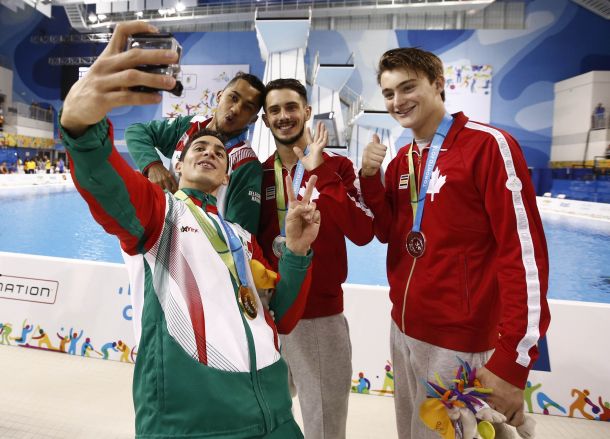Former World and Olympic champions stepped up to the plate at the Pan-American Games as two countries walked away with a combined 18 medals across eight disciplines.
Mexico lead the field with five gold medals, winning the men's 10m platform, men's 3m springboard, men's synchronised 3m springboard, women's 10m platform, and women's synchronised 3m springboard. That added a silver and three bronze medals to their total, as well.
The Mexican team entered these competitions as the clear favorite in several platforms, having a team that has won various world and Olympic medals in the past. The team was lead by Paola Espinosa, who won the gold medal in the 10m platform event at the 2009 World Championships, and a silver in the synchro event in London; however, she was shut out of the medals at the World Championships in 2013. She regained her form and won the gold medal in the 10m platform this week, and added a gold in the 3m synchro springboard with new partner, 18-year-old Dolores Hernandez. Espinosa will be giving the Olympics one last shot in Rio next year.
While Mexico is overjoyed with their results in the women's events, it is the men's events that leave them the most encouraged. 21-year-old Ivan Garcia,, who won a silver medal in the 2012 Olympic Games in the 10m synchro platform, won the 10m platform. Veterans Rommel Pacheco and Jahir Ocampo,, who won the bronze medal at the World Championships in the 3m synchro springboard, took home the gold in the same discipline this week. The two also finished first and second in the individual 3m springboard, with Pacheco taking home the gold.
For the Canadian team, it was about building the women's team into an international powerhouse and building off of successes from the previous Olympic and World Championships. Their strongest discipline is the women's 3m springboard, where they have finished on the podium in both the previous Olympic and World Championships. The women went one-two in the event, with Jennifer Abel winning the gold and Pamela Ware, who won the bronze in the World Championships in 2013, took home the silver. The two, who have been Canada's top synchro team since 2011, took home the gold in the 10m springboard synchro event. The men failed to win a gold medal in the event, but should be encouraged by their young synchro team taking home the silver in both the 3m and 10m events.
The only thing that prevented a clean sweep of the gold medals by these two countries was the Cuban men's 10m platform synchro team, lead by veteran Jose Antonio Guerra, the 35-year-old that competed in the last four Olympic Games.
Mexico and Canada will not have much time to celebrate, as their teams will be flying to Kazan, Russia for the 2015 World Aquatics Championships, which begin next week. Canada and Mexico are the two countries that provide the biggest challenge to the China's dominance in diving. China won six of eight gold medals in London and nine of ten gold medals at the 2013 World Championships. They swept the gold medals in their home country during the 2008 Olympics, and have the strongest junior program in the world, meaning as the older competitors retire, they have replacements that are as good. Mexico and Canada have the competitors and the experience to compete, but it will be an uphill battle.
The United States elected not to bring their best competitors as they focused on the World Championships. Instead, they decided to send some young competitors in an attempt to get them some reps in international competition. The men and women both won a bronze medal in the synchronised 3m springboard.






































